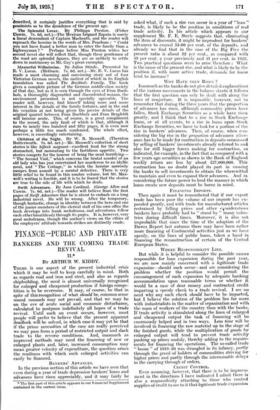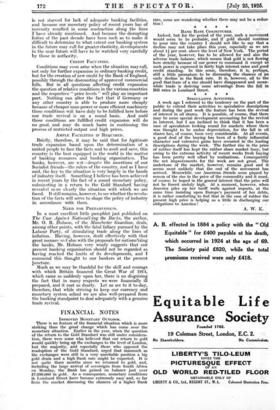FINANCE -PUBLIC AND PRIVATE
BANKERS AND THE COMING TRADE REVIVAL
II.* BY ARTHUR W. KIDDY.
THERE is one aspect of the present industrial crisis which it may be well to keep carefully in mind. Both as regards coal and iron and steel, and also as regards shipbuilding, the need is almost universally recognized for enlarged and cheapened production if foreign compe- tition is to be overcome. It may, of course, be that in spite of this recognition of what should be, common sense sound counsels may not prevail, and that we may be on the eve of acute social and economic disturbance, calculated to postpone indefinitely all hopes of a trade revival. Until such an event occurs, however, most people will prefer to believe that the present apparent deadlock will be solved, in which case it may yet be that if the prime necessities of the case are really perceived we may pass from a period of restricted output and slack trade to the reverse conditions. And, inasmuch as improved methods may need the financing of new or enlarged plants and, later, increased consumption may mean greater velocity of expenditure, the question arises the readiness with which such enlarged activities can easily be financed.
BANKERS' ADVANCES.
In the previous section of this article we have seen that even during a year of trade depression bankers' loans and advances have risen appreciably, and it may fairly be
*The first part of this article appears in our Financial Supplement contained in the current issue. •
asked what, if such a rise can occur in a year of "lean " trade, is likely to be the position in conditions of real trade activity. In his article which appears in our supplement Mr. F. E. Steele suggests that, eliminating the item of discounts, it might be imprudent for bankers' advances to exceed 55-60 per cent. of the deposits, and already we find that in the case of the Big Five the present ratio is about 52 per cent., as compared with 49 per cent. a year previously and 41 per cent, in 1922: Two practical questions seem to arise therefore : What is the cause of the present rise, and what is likely to be the position if, with more active trade, demands for loans tend to increase ?
WHY HAVE TIIEY RISEN ?
Inasmuch as the banks do not give detailed explanations of the various movements in the balance sheets it follows that the first question can only be dealt with along the lines of conjecture. It is impossible, however, not to remember that during the three years that the proportion of advances has risen, although commodity prices have fallen, Stock Exchange Securities as a whole have risen greatly, and I think that to a rise in Stock Exchange loans, or at all events, to a rise in loans upon Stock Exchange Securities, we have to look for a portion of the rise in bankers' advances. Then, of course, when con- sidering the big rise in the proportion of advances allow- ance has to be made for contraction in deposits occasioned by selling of bankers' investments already referred to and also for still bigger forces making for contraction, as indicated, for example, in the fact that as compared with a, few years ago securities as shown in the Bank of England weekly return are less by about £27,000,000. This contraction has no doubt played its part in causing the banks to sell investments to obtain the wherewithal to maintain and even to expand their advances. And in considering:the future power to lend the manner in which loans create new deposits must be borne in mind.
FINANCING- IMPORTS.
Then again it must be remembered that if our export trade has been poor the volume of our imports has ex- panded greatly, and with trade for manufactured articles restrained by falling prices and other crsiderations bankers have probably had to " stand by " many indus- tries during difficult times. Moreover, it is also not improlable that since the time of the adoption of the Dawes Report last autumn there may have been rather more financing of Continental activities just as we have openly, on the lines of public loans, taken a hand in financing the reconstruction of certain of the Central European States.
WHERE RESPONSIBILITY LIES.
But while it is helpful to consider the possible causes responsible for loan expansion during the past year, we are now mainly concerned with a legitimate trade expansion—should such occur—and are considering the problem whether the position would permit the encouragement of such expansion by adequate banking accommodation upon reasonable terms or whether it would be a case of dear money and contracted credit imparting a speedy check to a trade revival. I see no need why any such check should have to be imparted, but I believe the solution of the problem lies far more with industrialists in the matter of organization and with the mass of workers of the country than with the banks. If trade activity is stimulated along the lines of enlarged and cheapened output the task of financing will be enormously helped and in two ways. Less time will be involved in financing the raw material up to the stage of the finished goods, while the multiplication of goods by enlarged output will tend to prevent trade activity pushing up prices unduly, thereby adding to the require- ments for financing the operations. The so-called trade " boom " of 1919-20 was strangled in its infancy, partly through the greed of holders of commodities striving for higher prices and partly through the interminable delays in the carrying through of orders.
CREDIT CONTROL.
Even assuming, however, that there is to be i improve- ment in the directions I have indicated I admit there is also a responsibility attaching to those who control supplies of credit to see to it that legitimate trade expansion is not starved for lack of adequate banking facilities, and because our monetary policy of recent years has of necessity resulted in some contraction along the lines rhave already mentioned. And because the disrupting foiCes of the past decade have been such as to make it difficult to determine to what extent our banking system in the future may call for greater elasticity, developments in the near future will have to be watched very carefully by those in authority.
CREDIT FACILITIES.
Conditions may even arise when the situation may call, not only for further expansion in ordinary banking credit, but for the creation of new credit by the Bank of England, possibly through the discounting of approved commercial bills. But in all questions affecting credit expansion the question of relative conditions in the various countries and the respective " price levels " will play an important part. Nothing can alter the fact that if Germany or any other country is able to produce more cheaply because of cheaper man-power or more efficient machinery those conditions will have duly to be fulfilled here before our trade revival is on a sound basis. And until those conditions are fulfilled credit expansion will do no good, and may do much harm in continuing the process of restricted output and high prices.
AMPLE FACILITIES IF REQUIRED.
Briefly, therefore, it may be said that for legitimate trade expansion based upon the determination of a united people to face the facts and to work and save, this country is the best equipped in the world in the matter of banking resources and banking organization. The banks, however, are ant—despite the assertions of our Socialist friends—the rulers of the country, and as I have said, the key to the situation is very largely in the hands of industry itself. Something I believe has been achieved in recent years by the fact of a sound monetary policy, culminating in- a return to the Gold Standard having revealed m we clearly the situation with which we are faced. It still remains, however, to see whether the revela- tion of the facts will serve to shape the policy of industry in accordance with them.
NEED FOR PREPAREDNESS.
In a most excellent little pamphlet just published on The Case Again4 Nationalizing the Barks, the author, Mr. 0. It. .Hobson, of the Manchester Guardian, deals, among Other points, with the fatal fallacy pursued by the Labour Party, of stimulating trade along the lines Of inflation. Having, however, dealt effectively with that great menace ar3 also with the proposals for nationalizing the banks, Mr. Hobson very wisely suggests that our present banking organization should not be regarded as having reached the limits of its developments, and I commend this thought to our bankers at the present juncture. Much as we may be thankful for the skill and courage with which Britain financed the Great War of 1914, which came so suddenly upon her, there is no disguising the fact that in many respects we were financially ill prepared, and it cost us dearly. - Let us see to it to-day, therefore, that while striving to keep our currency and monetary system sound we are also well-prepared from the banking standpoint to deal adequately with a genuine trade revival.



























































 Previous page
Previous page